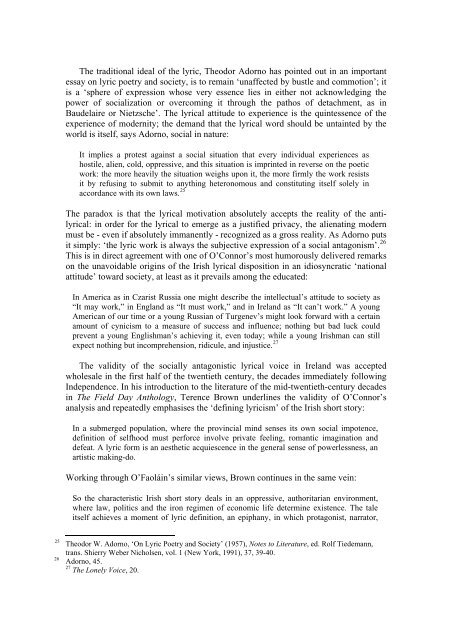Inside Out: A Working Theory of the Irish Short Story. John Kenny
Inside Out: A Working Theory of the Irish Short Story. John Kenny
Inside Out: A Working Theory of the Irish Short Story. John Kenny
You also want an ePaper? Increase the reach of your titles
YUMPU automatically turns print PDFs into web optimized ePapers that Google loves.
The traditional ideal <strong>of</strong> <strong>the</strong> lyric, Theodor Adorno has pointed out in an important<br />
essay on lyric poetry and society, is to remain ‘unaffected by bustle and commotion’; it<br />
is a ‘sphere <strong>of</strong> expression whose very essence lies in ei<strong>the</strong>r not acknowledging <strong>the</strong><br />
power <strong>of</strong> socialization or overcoming it through <strong>the</strong> pathos <strong>of</strong> detachment, as in<br />
Baudelaire or Nietzsche’. The lyrical attitude to experience is <strong>the</strong> quintessence <strong>of</strong> <strong>the</strong><br />
experience <strong>of</strong> modernity; <strong>the</strong> demand that <strong>the</strong> lyrical word should be untainted by <strong>the</strong><br />
world is itself, says Adorno, social in nature:<br />
It implies a protest against a social situation that every individual experiences as<br />
hostile, alien, cold, oppressive, and this situation is imprinted in reverse on <strong>the</strong> poetic<br />
work: <strong>the</strong> more heavily <strong>the</strong> situation weighs upon it, <strong>the</strong> more firmly <strong>the</strong> work resists<br />
it by refusing to submit to anything heteronomous and constituting itself solely in<br />
accordance with its own laws. 25<br />
The paradox is that <strong>the</strong> lyrical motivation absolutely accepts <strong>the</strong> reality <strong>of</strong> <strong>the</strong> antilyrical:<br />
in order for <strong>the</strong> lyrical to emerge as a justified privacy, <strong>the</strong> alienating modern<br />
must be - even if absolutely immanently - recognized as a gross reality. As Adorno puts<br />
it simply: ‘<strong>the</strong> lyric work is always <strong>the</strong> subjective expression <strong>of</strong> a social antagonism’. 26<br />
This is in direct agreement with one <strong>of</strong> O’Connor’s most humorously delivered remarks<br />
on <strong>the</strong> unavoidable origins <strong>of</strong> <strong>the</strong> <strong>Irish</strong> lyrical disposition in an idiosyncratic ‘national<br />
attitude’ toward society, at least as it prevails among <strong>the</strong> educated:<br />
In America as in Czarist Russia one might describe <strong>the</strong> intellectual’s attitude to society as<br />
“It may work,” in England as “It must work,” and in Ireland as “It can’t work.” A young<br />
American <strong>of</strong> our time or a young Russian <strong>of</strong> Turgenev’s might look forward with a certain<br />
amount <strong>of</strong> cynicism to a measure <strong>of</strong> success and influence; nothing but bad luck could<br />
prevent a young Englishman’s achieving it, even today; while a young <strong>Irish</strong>man can still<br />
expect nothing but incomprehension, ridicule, and injustice. 27<br />
The validity <strong>of</strong> <strong>the</strong> socially antagonistic lyrical voice in Ireland was accepted<br />
wholesale in <strong>the</strong> first half <strong>of</strong> <strong>the</strong> twentieth century, <strong>the</strong> decades immediately following<br />
Independence. In his introduction to <strong>the</strong> literature <strong>of</strong> <strong>the</strong> mid-twentieth-century decades<br />
in The Field Day Anthology, Terence Brown underlines <strong>the</strong> validity <strong>of</strong> O’Connor’s<br />
analysis and repeatedly emphasises <strong>the</strong> ‘defining lyricism’ <strong>of</strong> <strong>the</strong> <strong>Irish</strong> short story:<br />
In a submerged population, where <strong>the</strong> provincial mind senses its own social impotence,<br />
definition <strong>of</strong> selfhood must perforce involve private feeling, romantic imagination and<br />
defeat. A lyric form is an aes<strong>the</strong>tic acquiescence in <strong>the</strong> general sense <strong>of</strong> powerlessness, an<br />
artistic making-do.<br />
<strong>Working</strong> through O’Faoláin’s similar views, Brown continues in <strong>the</strong> same vein:<br />
So <strong>the</strong> characteristic <strong>Irish</strong> short story deals in an oppressive, authoritarian environment,<br />
where law, politics and <strong>the</strong> iron regimen <strong>of</strong> economic life determine existence. The tale<br />
itself achieves a moment <strong>of</strong> lyric definition, an epiphany, in which protagonist, narrator,<br />
25<br />
Theodor W. Adorno, ‘On Lyric Poetry and Society’ (1957), Notes to Literature, ed. Rolf Tiedemann,<br />
trans. Shierry Weber Nicholsen, vol. 1 (New York, 1991), 37, 39-40.<br />
26 Adorno, 45.<br />
27<br />
The Lonely Voice, 20.

















